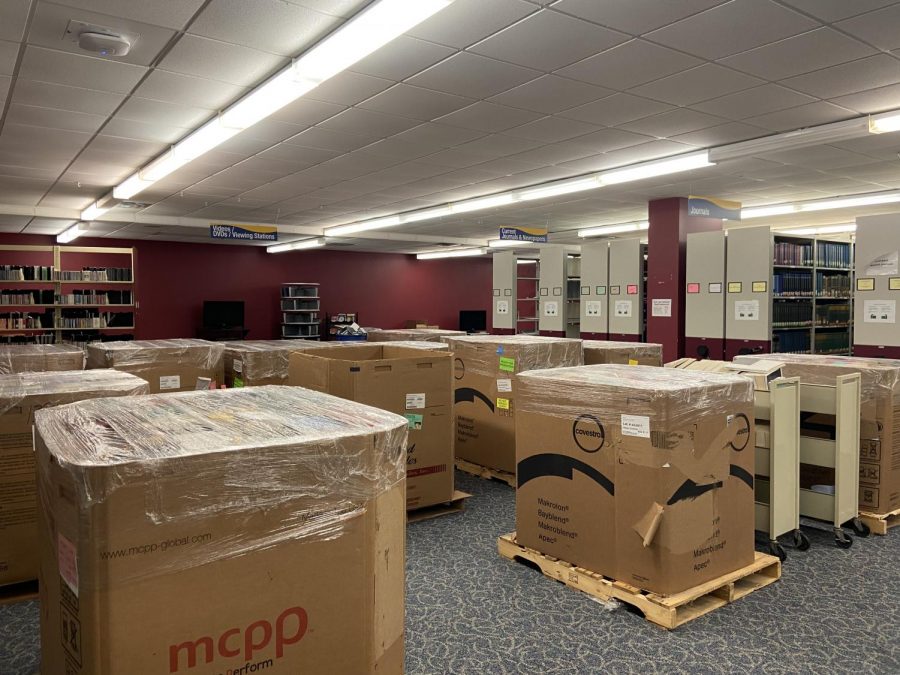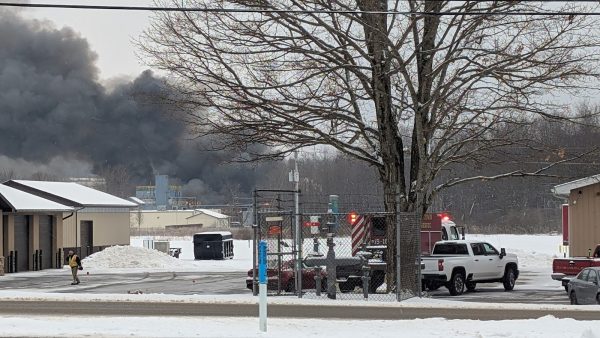Pelletier donates thousands of books to clear space
Pallets of books sit in the basement of Pelletier Library. As of this writing, Pelletier has “winnowed” more than 82,000 books from its collection.
The top floor of the Lawrence Lee Pelletier Library is slated to undergo remodeling as part of the campus master plan.
The master plan, which entails renovation and remodeling plans for the infrastructure and the administration of the college, was last updated in 2018.
“(The master plan looks) at all the buildings (and asks)what could they be, which buildings need to be refreshed, how can they be used?” Chief Financial Officer Linda Wetsell said.
Library staff began the process of clearing out the top floor in 2018 for remodeling purposes. However, no final plan is determined yet about how the top floor will be remodeled.
“We may have had some ideas back when we looked at (the library in 2018) but they don’t have to be the final ideas because it all depends on if we have the money,” Wetsell said.
Pelletier has been used for many purposes in the past. Library and Information Technology Services Director of Public Services Aimee Reash, ’96, recalled that the top floor was even used as a smoking lounge in the past.
“At one point in time we had a lounge up there (on the top floor) on either side we had a smoking lounge and a staff lounge,” Reash said. “I was a student here from ’92 to ’96 and I don’t think it existed back then so it was here a long time ago.”
The use of the top floor of the Pelletier has changed over the years in accordance with the context and needs of the time, according to Reash.
“Things have come and gone overtime on the top floor,” Reash said. “For example, I don’t exactly know when the archives department was put in place, but it is currently on the top floor.”
Although plans are unclear for how the top floor of the Pelletier is going to be used, Wetsell is sure that it will be used for multiple purposes extending from a student support space to an office area.
“We might relocate the whole IT department up there or the Registrar’s office because it would be tied into the student success area on the first floor,” Wetsell said. “It could even be a more general purpose area like the classrooms we have on the first floor.”
The top floor of the Pelletier is likely to include shared spaces like the classrooms on the ground floor, but on a larger scale, according to Director of Physical Plant Joseph Michael.
“We are looking to mirror the west side of the first floor and the classroom spaces but we want to have larger spaces,” Michael said. “It doesn’t just have to be classrooms; what we really want is for students to have a space to quietly sit down with some work.”
Wetsell emphasized the importance of realizing the needs of students along with the advances in STEM that are likely to occur in the future and are already present. The administration realizes that more traditional student workspaces will likely need to be modified in the future and will look to keep this in mind when determining the functionality of the top floor of the Pelletier.
“We know that study spaces are important to the students so we are trying to keep in mind what they might look like in the future,” Wetsell said. “We want there to be more conducive study spaces for the students where they can do more and feel more comfortable.”
LITS staff went through a lengthy process of creating data on unused books in relation to their winnowing project.
“Once we had created data we compared our circulation statistics, which means how many times an item was checked in and checked out,” Reash said. “When the circulation data of a book was zero or close to zero we decided to terminate that title from our collection.”
Reash clarified that any books that are set aside to be offloaded are first ensured to be accessible at another library in the tri-state area of Pennsylvania, New York and Ohio through Allegheny’s interlibrary loan system.
“We ensured that for any item that we did end up disassociating from in our collection that there was another library relatively close in the tri-state area to take them,” Reash said.
Associate Director of the Library Brian Kern also explained other factors that determined whether or not a book would remain in the library collection or be donated.
“We looked at when the book was published and decided to keep books that were less than 20 years old and the library had to have had the book for at least 10 years,” Kern said. “We also got rid of books that had no more than two documented circulations ever.”
College faculty were also given an opportunity to decide whether or not they believed a book to be valuable enough and could ask for a book to not be offloaded.
According to Kern, a large number of books have been rounded up and set aside for donation over the past three years.
“As of today the number that has been winnowed is 82,572,” Kern said.
Allegheny College is working in partnership with Better World Books which is a social enterprise that sells new and used books and donates a portion of its revenue to fund literacy initiatives. Unsold books are donated to underprivileged communities across the United States.
“The books go to Better World in York, Pennsylvania where they try to sell the books, and you can often find their products on Amazon,” Kern said. “The books that can’t be sold, they donate to third world countries as part of their literacy initiative or they are scanned to be a part of the internet archive.”

Hassan Javed is a junior from Lahore, Pakistan. He is majoring in Communication and Media Studies while minoring in Psychology. This is his third year...










